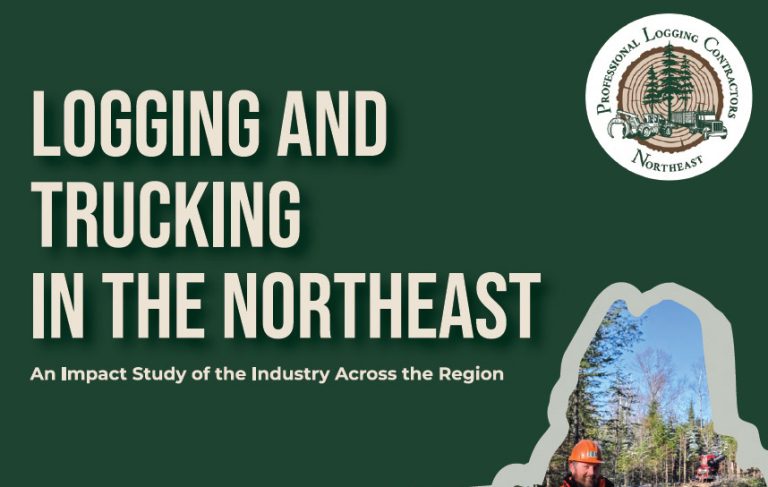Maine loggers urge support of federal COVID-19 relief package for logging and trucking companies in the United States
AUGUSTA – The Professional Logging Contractors (PLC) of Maine is urging support of bipartisan, bicameral legislation introduced in the U.S. House and Senate today that would provide federal relief to family logging and trucking businesses in the United States that have suffered market and revenue losses due to the COVID-19 pandemic.
U.S. Senator Susan Collins (R-ME), Congressman Jared Golden (ME-02), Congressman David Rouzer (NC-07), and Senator Tina Smith (D-MN) introduced the legislation. Senator Angus King (I-ME) is a co-sponsor.
The lawmakers’ Loggers Relief Bill 7_14_20 would establish a new program at the U.S. Department of Agriculture (USDA) to provide direct payments to timber harvesting and hauling businesses that can demonstrate they have experienced significant economic hardship compared to the previous year. The logging industry has experienced a steep decline in demand for wood fiber since the coronavirus pandemic began, leading to an estimated 20 percent or more drop in the timber harvest this year.
Like loggers and forest truckers across the United States, Maine’s logging and forest trucking companies have been badly hurt by the economic slowdown caused by the pandemic, which has lowered demand for many products made with wood and wood fiber. In Maine, many logging businesses were already struggling with limited harvest opportunities due to poor weather conditions through most of the winter. To make matters worse, a month after the pandemic officially began, the industry suffered the loss of the Pixelle Specialty Solutions pulp mill in Jay to an explosion.
“The economic uncertainty and loss of markets created by the COVID-19 pandemic have hit the Maine logging and forest trucking industry at a time when it was already suffering from the effects of a mild winter, early spring, and low profit margins,” Dana Doran, Executive Director of the Professional Logging Contractors of Maine, said. “Without federal relief, many in this industry will not survive. They need help now, and we are thankful for Senator Collins’ and Rep. Golden’s recognition of these challenges and for working towards a solution that can keep our hard-working logging and trucking families employed while preserving the future of the industry and the rural communities that depend on it.”
The program envisioned in Collins and Golden’s bill is modeled after the USDA’s Coronavirus Food Assistance Program, which has been providing direct relief to growers and producers experiencing dramatic drops in prices and overall business activity due to the pandemic. Specifically, the legislation would direct the Secretary of Agriculture to provide payments to eligible logging businesses that have experienced at least a 10 percent loss in revenues from January through July 2020 as compared to the same timeframe last year. Those who qualify would receive direct payments equal to 10 percent of their gross revenue from January through July of last year, and would only be permitted to use the funds for operating expenses, including payroll.
Under the CARES Act, Congress has already provided $300 million to the nation’s fishing industry and $16 billion for dairy and livestock producers as well as fruit and vegetable growers.
The PLC led early efforts to seek this proposed relief package and has urged Maine’s Congressional delegation to support it. If successful, it would be the first direct aid to the logging and forest trucking industry of the pandemic and perhaps one of the only times in U.S. history that Congress has helped loggers and truckers directly.
A recent survey of the membership of the Professional Logging Contractors of Maine (PLC), the state’s trade association for loggers and forest truckers, found that 88 percent of respondents have been negatively impacted by the pandemic.
Those impacts include revenue losses, layoffs, loss of clients, reduced productivity, and inability to plan for the future. Many respondents reported experiencing all these effects. The companies responding to the survey represented 44 percent of the total membership of PLC, and the predicted harvest losses for this subgroup alone would represent a minimum 6.8 percent of Maine’s total wood harvest for the most recent year for which data is available, 2018.
“As time goes on and market impacts continue to mount, it is our prediction that a minimum of 20% of the annual timber harvest could be impacted,” Doran said. “A 20% reduction in timber harvesting means a nearly $86 million direct economic loss for the Maine economy and over 600 jobs eliminated. Clearly, a lot is on the line.”
Maine loggers expressed gratitude for the efforts made by Sen. Collins and Rep. Golden on their behalf.
“We all feel the effect COVID-19 is having on the world today. Logging and Trucking companies in Maine have come across these difficulties as well, with the loss of wood markets and many other mills on quotas or not taking wood at all. We have certainly been challenged in these unprecedented times. Our companies certainly could use some help to survive these trying times without losing any more valuable loggers and truckers forever. Thank you Senator Collins and Congressman Golden for all of your efforts on our behalf.” – Jim Nicols, President of Nicols Brothers Logging Inc. of Mexico and current President of the PLC.
“COVID 19 is affecting demand for wood, which is having a big impact on the prices loggers are getting. My honest opinion is that every industry could use some help in this pandemic, but it seems like we never get included, so I appreciate what Congressman Golden and Senator Collins are attempting to do on our behalf with this bill because right now we could use some help.” – Ron Ridley, President, L&A Ridley, Inc. of Jay, ME.
“The COVID-19 pandemic has devastated Maine logging and trucking industries. The forest products market is severely depressed because of the United States and other countries shutting down. We need help! Thank you Representative Golden and Senator Collins for supporting Maine loggers and truckers.” – Tony Madden, President, A.W. Madden Inc. of Milford, ME.
“Due to COVID-19 our company has exhausted all options for keeping our equipment working at normal capacity. We have reached out to landowners and other contractors for work and have found all to be in the same situation. Local mills are not taking wood or will be on quotas. We are extremely grateful for the help and support that Senator Collins and Rep. Golden have provided for us. With their help we look forward to a plan that can help all Maine loggers remain successful in keeping Maine’s economy going.” – Ben Voisine, President, Voisine Brothers Inc. of Fort Kent Mills
“Loggers and wood hauling truckers are traditionally extremely independent people who are wired to produce and not ask for favors. Any kind of help can be confused as handouts. The challenge for our political leaders is to determine which is more costly to our society, providing financial support to maintain the existing forest resource producer supply chain, or wait and hope that the forest resource supply chain can survive or rebuild. We believe that it will be more cost effective to keep the current forest resource supplier chain intact and therefore we are thankful and supportive of Senator Collins’ and Congressman Golden’s effort to do so.” -Brian Souers, President, Treeline Inc. of Chester ME.
Maine’s story is very consistent with other timber producing states across the country where mills have reduced their consumption of wood during the COVID-19 pandemic as a result of reduced or lost markets. Combined with high operating costs and low returns on investments, this collapse in wood demand threatens the survival of logging and log hauling businesses and means that harvesting capacity throughout the United States could be deeply reduced by this crisis. In Maine of course, the loss of the Pixelle pulp mill in Jay has greatly compounded this issue.
In order to sustain the supply chain on which the entire national forest products economy depends, the 34 member associations of the national American Loggers Council (ALC), which includes the PLC, coalesced around the proposal introduced today.
The PLC and other logging organizations across the nation have noted federal aid was directed to the U.S. farming and fishing industries even before the full impact of the pandemic on those industries had been realized, and are hopeful their representatives in Washington D.C. will now act in a similar fashion to provide relief to U.S. loggers and forest truckers.


